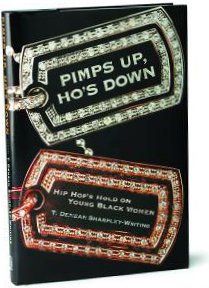
In hip-hop music and videos, young black women are consistently portrayed as sexually insatiable vixens willing to debase themselves for the privilege of even the shortest ride on the music industry party train. Despite the lack of respect, young black women play an enthusiastic part in hiphop culture, as do youth of all races who continue to make hip-hop a worldwide phenomenon.
Tracy Denean Sharpley-Whiting– Vanderbilt University professor, young black woman, former model, feminist and hip-hop fan–researched this paradox and responded with Pimps Up, Ho’s Down: Hip Hop’s Hold on Young Black Women. The book, published by New York University Press, offers an insightful look into the strip clubs, groupie culture, and other aspects of hip hop that have given a voice to the disenfranchised while raising troubling questions about what those voices are saying and doing.
“As disturbing as I find some of what’s going on around gender in hip-hop, there are also things we need to celebrate,” says Sharpley-Whiting, who is a professor of African American and diaspora studies and professor of French. “It’s a cultural art form. It’s the soundtrack of black life in the United States, and it’s absolutely astonishing that it became such a cultural force globally.

“We have to revel in that kind of creativity coming from such a marginalized group.”
The book paints a complex portrait with one constant: Black women are always at the bottom of any pecking order.
“That doesn’t mean I find hiphop depressing,” says Sharpley-Whiting. “I find the state of gender and race relationships depressing. Just because aspects of hip-hop may be misogynistic and sexist does not mean that misogyny began with hip-hop.Hip-hop just happens to be the youth culture of the moment and therefore takes the wrath on a lot of issues.”
Any solutions will involve changing society rather than stifling hip-hop’s blunt articulation of what’s going on, she says, adding, “I do urge young women to be more politically conscious about the choices they make and the opportunities they take.”
Sharpley-Whiting is director of Vanderbilt’s African American and Diaspora Studies Program and director of the William T. Bandy Center for Baudelaire and Modern French Studies.